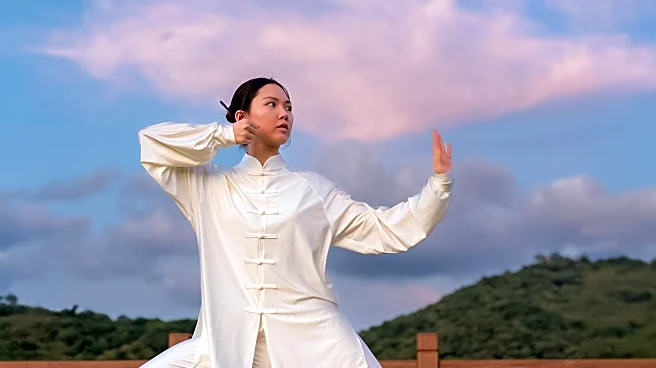What's Happening?
Recent studies have highlighted the cognitive benefits of Tai Chi, an ancient Chinese practice often described as 'meditation in motion.' After eight weeks of regular practice, participants have shown
significant improvements in memory, focus, and mental flexibility. Research published in Frontiers and supported by the National Institute of Health indicates that Tai Chi can lead to measurable changes in brain structure, including increased volume in regions responsible for memory and decision-making. MRI scans have revealed enhancements in the prefrontal cortex and temporal lobes, areas crucial for cognitive functions. Tai Chi's unique combination of physical movement, memorization, and steady breathing is believed to improve executive function, which involves multitasking, decision-making, and planning.
Why It's Important?
The findings underscore Tai Chi's potential as a powerful tool for cognitive health, offering benefits that rival or exceed those of conventional exercises like walking or aerobic activities. This practice is particularly significant for older adults and individuals with mild cognitive impairment, as it can enhance verbal and working memory, potentially stalling or reversing cognitive decline. Tai Chi's accessibility makes it an attractive option for a wide range of people, including those with chronic illnesses, providing a low-impact, cost-effective method to improve brain health and overall well-being. The practice's ability to foster social interaction and community support further amplifies its mental health benefits.
What's Next?
As Tai Chi gains recognition for its cognitive benefits, it may see increased adoption in wellness programs and therapeutic settings, particularly for aging populations and those at risk of cognitive decline. Continued research could further elucidate the mechanisms behind Tai Chi's effects on brain health, potentially leading to more targeted interventions. Healthcare providers and policymakers might consider integrating Tai Chi into public health strategies to promote mental resilience and reduce dementia risk.
Beyond the Headlines
Tai Chi's impact on brain health highlights broader implications for holistic approaches to wellness, emphasizing the integration of physical, cognitive, and social elements. This ancient practice challenges the conventional focus on high-intensity workouts and digital brain-training apps, offering a natural, sustainable path to cognitive enhancement. The growing body of evidence supporting Tai Chi may inspire a shift towards more inclusive and accessible health practices, fostering a culture of mindfulness and community engagement.








